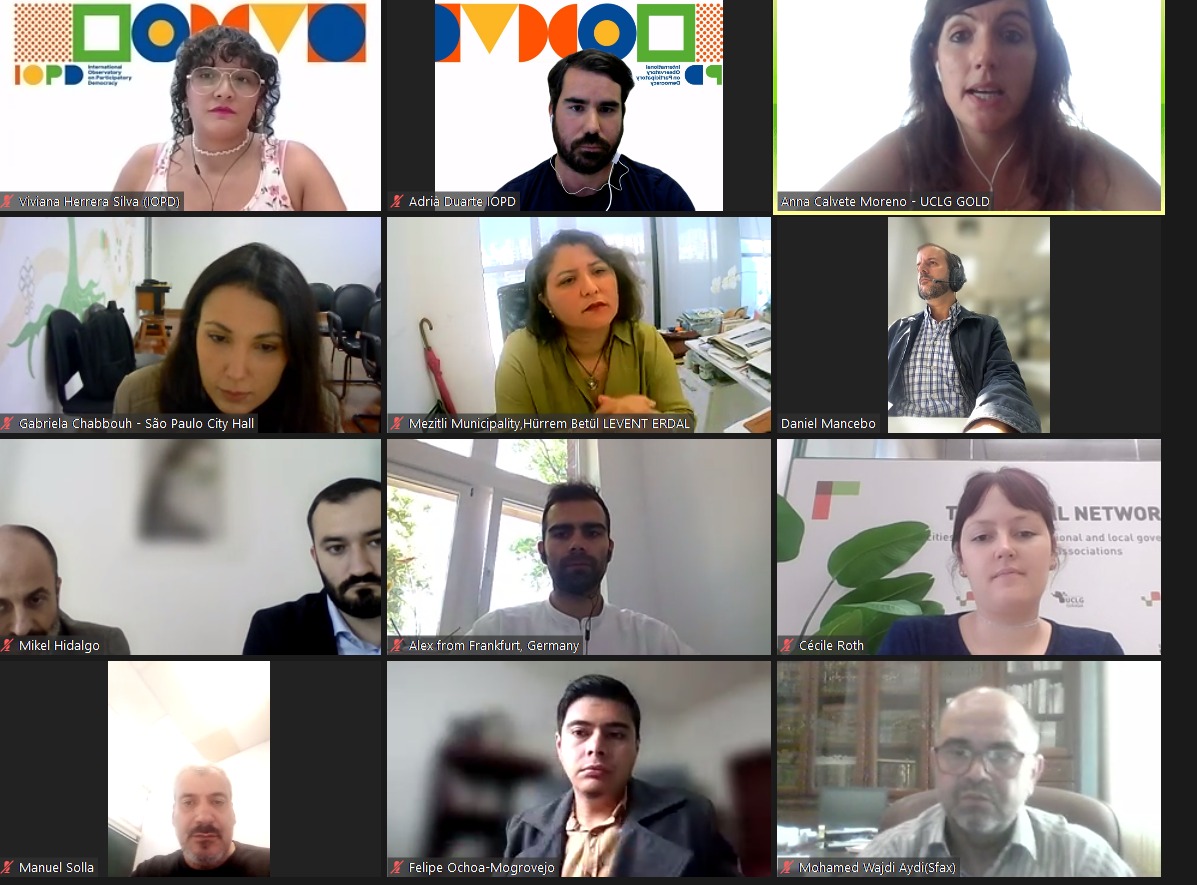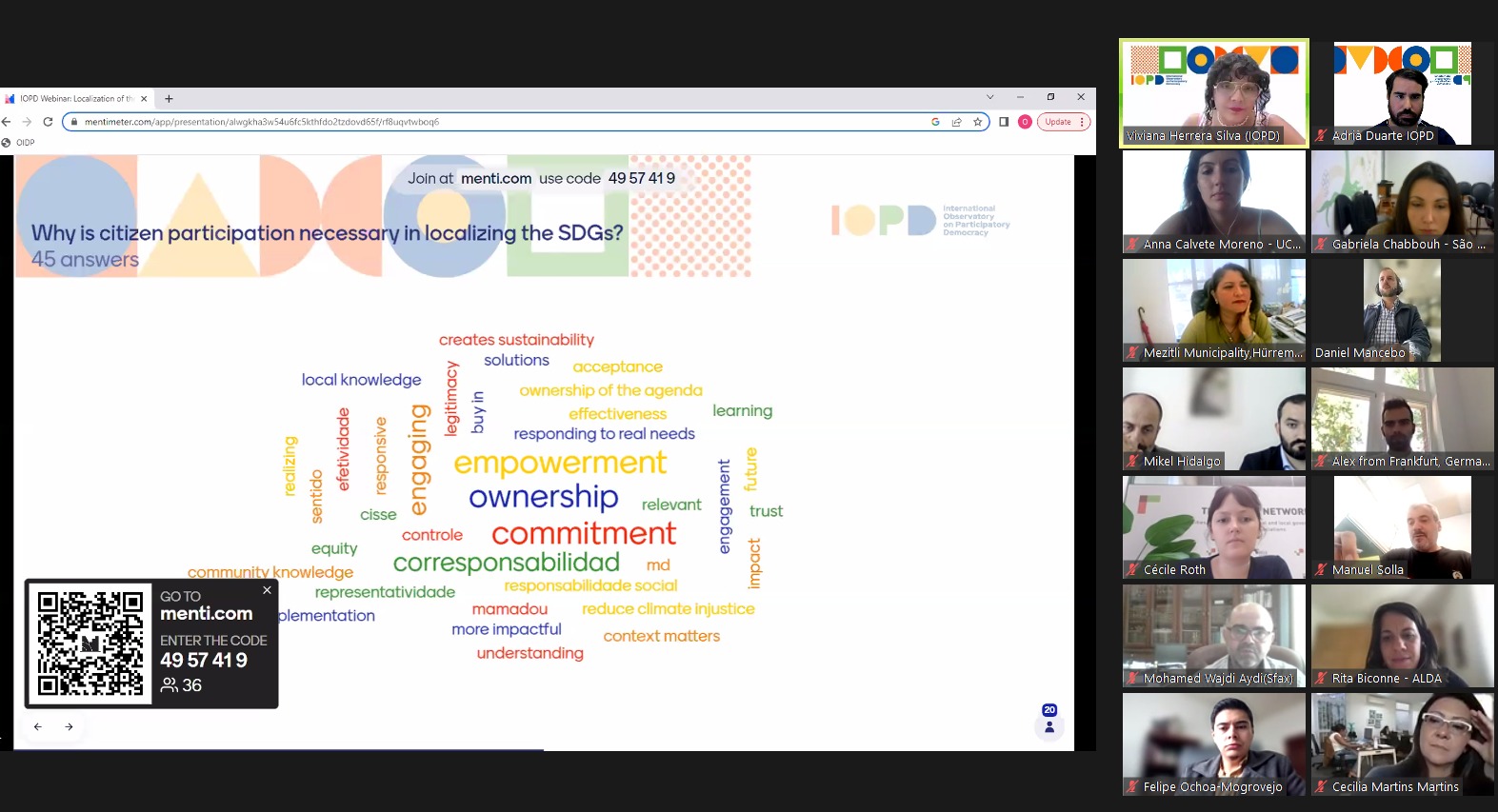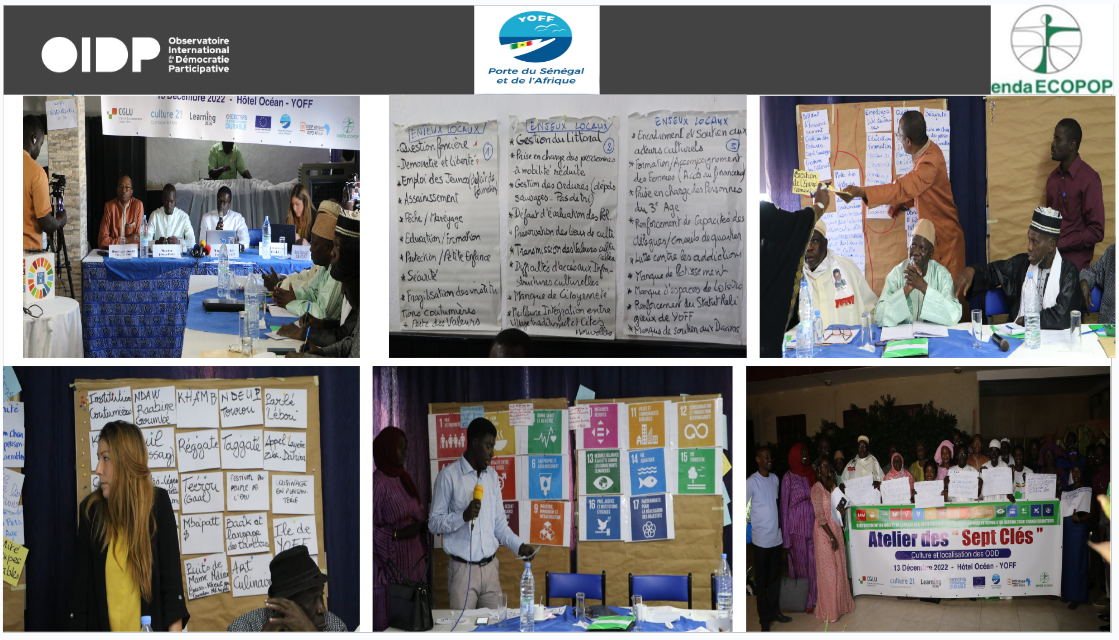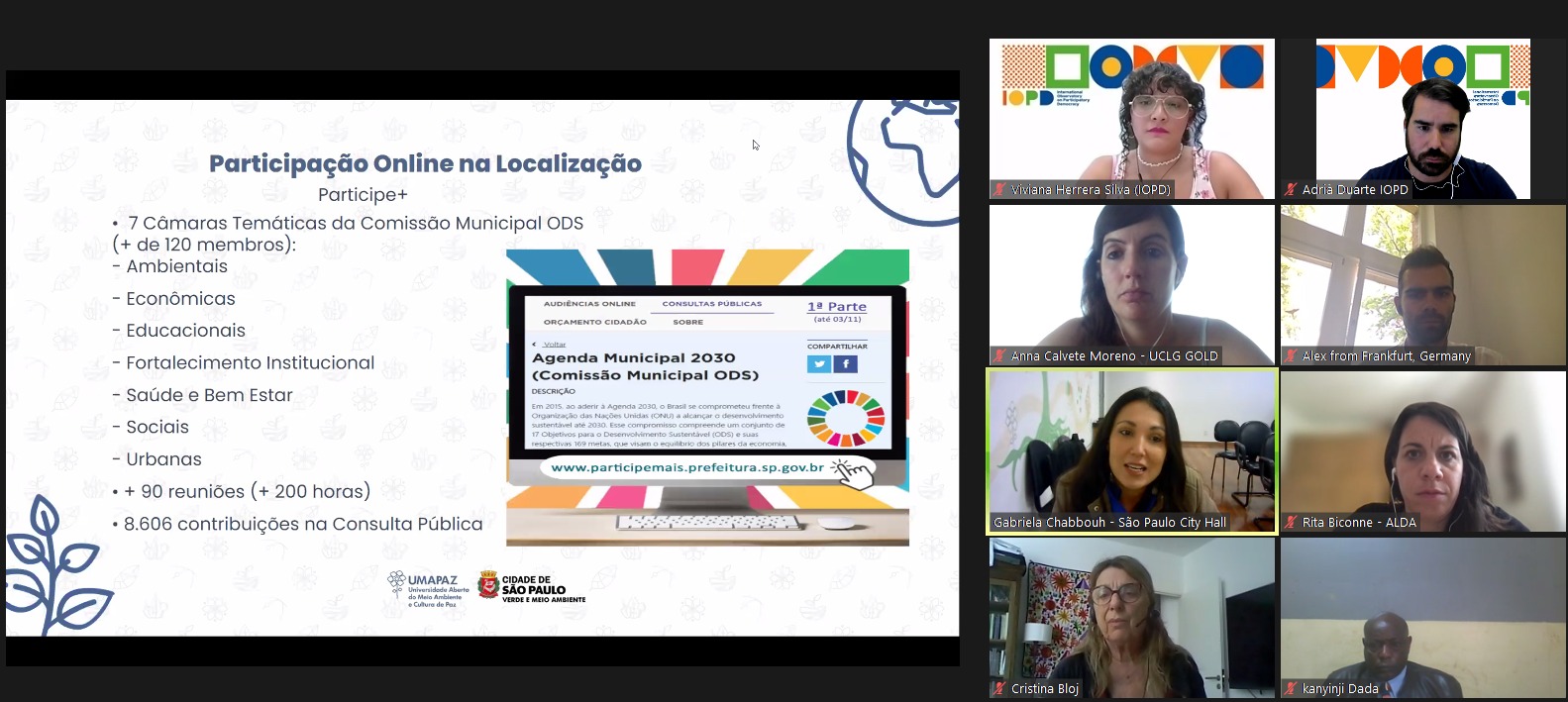Citizenship and local governments co-create solutions to localize Agenda 2030 and the SDGs

On July 5, 2023, the International Observatory on Participatory Democracy (IOPD), with the support of United Cities and Local Governments (UCLG) and the City of Rio de Janeiro, facilitated "Co-creation in localizing the SDGs: citizens and local governments co-create solutions to localize the 2030 Agenda and the SDGs',' a virtual session with local and regional governments to exchange knowledge, experiences and best practices on citizen co-creation in localizing the SDGs. Yoff, São Paulo, Euskadi, Cuenca, Mezitly and Rio de Janeiro are the six local and regional governments that took part in our webinar, which was attended by over 120 participants.
This virtual exchange space is the second in a series of three webinars in preparation for the IOPD Conference "Participatory Democracy for Diverse, Inclusive and Transparent Cities," to be held in Rio de Janeiro from November 6 to 8, 2023, as Viviana Herrera Silva, officer of IOPD, recalled at the opening of the session. Similarly, this session represents an important milestone in the framework of the High Level Political Forum (HLPF), where UCLG's mission will be to represent in this global forum the needs and aspirations of local and regional communities and governments to advance towards the 2030 Agenda, stressed Anna Calvete Moreno, of UCLG's Global Observatory of Local Democracy and Decentralization (GOLD).
Adrià Duarte, IOPD coordinator, explained that the aim of the session is to provide an overview of the localization of the Agenda 2030 and, in particular, the importance of involving citizens and civil society in this process. IOPD promotes participatory democracy as an essential tool of local and regional government governance in the design and implementation of public policies. In this sense, co-creation in localizing the SDGs is an opportunity to achieve better solutions, strengthen communities and build resilience in local cities and territories.
Anna Calvete, from UCLG's research team, presented some of the findings of the 7th annual report on localizing the SDGs, a first-hand compilation of experiences and good practices in localizing the SDGs shared by 145 local and regional governments. The report, which will be presented on behalf of the Global Taskforce this week at HLPF, revealed that local and regional governments still find the environment for making progress on the 2030 Agenda unhelpful, despite their commitment to achieving the SDGs. As we move closer to 2030 than 2015, when the 2030 Agenda was defined, there is an urgent need for national strategies and monitoring mechanisms to incorporate the participatory, bottom-up perspective that local and regional governments can offer, as they are the level of government closest to communities. In this context, it is all the more necessary for local and regional governments to promote participatory mechanisms to empower and encourage communities and civil society organizations in localizing the SDGs.
Before moving on to the exchange of experiences, a virtual consultation was held on the subject. Empowering communities, strengthening ownership and commitment to the 2030 agenda, responding to real needs, harnessing local knowledge, reducing climate and social injustice, and accelerating the achievement of the SDGs were some of the answers to the question "Why is citizen participation in localizing the SDGs necessary?". Participants agreed that enhancing inclusivity and diversity through innovations in citizen engagement mechanisms is one of the most important pillars for better co-creation in localizing the SDGs. Finally, they stressed that learning sessions and international observatories are the mechanisms that can best support this objective.

Seydina Issa Laye Samb, mayor of Yoff, spoke of the "7 keys to Yoff", an experiment in citizen participation and co-creation to identify the seven main priorities for promoting the town's cultural heritage. UCLG's Committee on Culture and ENDA ECOPOP (Espace de coproduction de propositions populaires pour l'environnement et le développement en Afrique) helped develop the participatory process with citizens, which involved various actors: civil society, cultural agents, the local press and traditional and religious authorities. The use of various physical and online participation tools, regular accountability exercises and the diversification of communication channels were the pillars on which this experience was built.

Daniel Mancebo, General Coordinator, Sub-Secretariat of Planning and Results Monitoring, Municipal Secretariat of Finance and Planning, shared Río de Janeiro's sustainable development plan, which combined the city's objectives with the SDGs. The innovation of this experience lies in the inclusion of different groups, the bridging of processes with diverse environments and the use of playful and digital tools. For example, children in their schools took part in games, and the general population in online tools such as the Participa.rio platform. All the knowledge that people contribute through participatory processes is fed back into the localization of the 2030 Agenda, where monitoring is also fundamental. To date, Rio de Janeiro has produced its second Voluntary Local Report (VLR).
Asier Aranbarri, Director of Social Innovation at the Basque Government's General Secretariat for Social Transition and Agenda 2030, shared that the regional strategy envisages a transformative approach to accelerating the localization of the SDGs. One of the pillars of this strategy is the creation of a multi-level governance forum to improve coordination between the three levels of government, particularly in terms of budget. Similarly, the inclusion of young people is essential. While inward-looking, the strategy deploys a global perspective, particularly with Bilbao as the headquarters of the Local Coalition 2030 Secretariat.
The contribution from Felipe Ochoa, Cuenca's Head of Cooperation and International Relations, focused on the initiative to educate and disseminate knowledge about the SDGs among citizens, as a first step in localizing the SDGs and encouraging democratic participation. This strategy involved various sectors essential to the city: civil servants, entrepreneurs and students, who received training on the nature of the SDGs, awareness-raising, dialogue, the alignment of plans and projects, and the development of VLRs and VNRs. Cuenca is preparing to present its next VLR in 2024.
Gabriela Chabbouh, Director of Environmental Education and Culture Training in São Paulo, brought the experience of her city, which has created a municipal committee to promote citizen co-creation in localizing the SDGs. This entity comprises inter-institutional work with eight institutions and 16 representatives of civil society, including private and academic initiatives. The committee has launched participatory processes through online tools and seminars, which are currently being expanded to involve a wider range of participants.

Hürrem Betül Levent Erdal, Urbanista y planificadora regional, City and Regional Planner Strategy, Development Manager, talked about the Mezitli, experience, which uses a global perspective to act locally with citizens to achieve a cleaner, more sustainable city. Thus, in 2021, the city launched a waste management project with a participatory approach, which included specific sectors, such as women traders in local markets. To date, the initiative has brought together over 200 volunteers who collect waste at the markets for sorting and recycling.
The IOPD secretariat is currently preparing a report on the policy recommendations made during the session, which will be published on our website. The third of the preparatory webinars for the IOPD 2023 conference will take place on September 15, on the occasion of the International Day of Democracy.
You can watch the session again here: